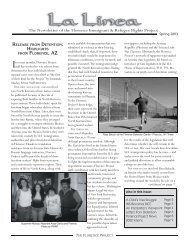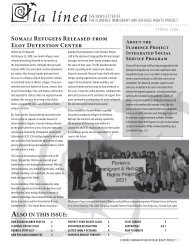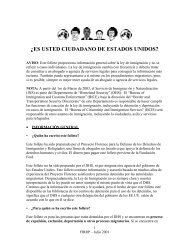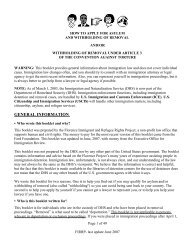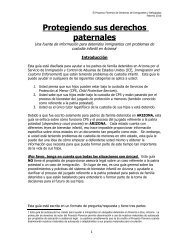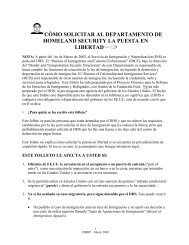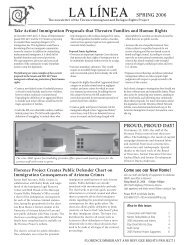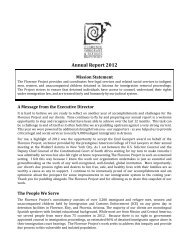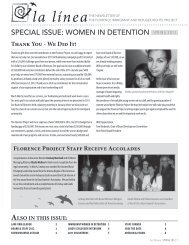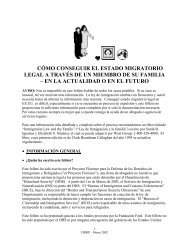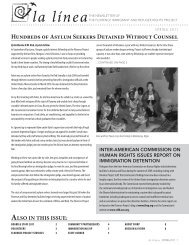quick reference chart and annotations for determining immigration ...
quick reference chart and annotations for determining immigration ...
quick reference chart and annotations for determining immigration ...
Create successful ePaper yourself
Turn your PDF publications into a flip-book with our unique Google optimized e-Paper software.
Immigrant Legal Resource Center, Florence Immigrant <strong>and</strong> Refugee Rights Project,<br />
Maricopa County Public Defender August 2012<br />
Aggravated Felony: Probably not. Although possession of paraphernalia with intent to commit<br />
a drug trafficking offense (such as manufacturing) could be held an aggravated felony, the vast majority<br />
of Arizona cases include only possession of paraphernalia <strong>for</strong> personal use <strong>and</strong> will not be held an<br />
aggravated felony.<br />
Aggravated Felony as a Trafficking Offense: Divisible. Unless the charging document<br />
specifically refers to possession of paraphernalia that could be used <strong>for</strong> trafficking offenses, <strong>immigration</strong><br />
judges will not find this to be an aggravated felony.<br />
Aggravated Felony as a Federal Analogue: Appears not to be. The only statute dealing with<br />
drug paraphernalia is 21 U.S.C. § 863(a) (sale, offer <strong>for</strong> sale, use of mails or interstate commerce to<br />
transport, or to import or export drug paraphernalia) <strong>and</strong> it is not sufficiently analogous to ARS 13-3415<br />
to make it an aggravated felony.<br />
Controlled Substance Ground: Probably. The Ninth Circuit has held that ARS § 13-3415 is<br />
categorically an offense relating to a controlled substance because the statute requires proof that the<br />
paraphernalia be linked to controlled substances. Luu-Le v. INS, 224 F.3d 911 (9th Cir. 2000). However,<br />
the BIA recently held that a waiver of inadmissibility may be available <strong>for</strong> a conviction of paraphernalia<br />
that relates to a single offense of simple possession of 30 grams or less of marijuana . Matter of<br />
Martinez-Espinoza, 25 I&N Dec. 118 (BIA 2009). This suggests that a conviction <strong>for</strong> paraphernalia<br />
could also fit into the similar exception to deportability if it involved 30 grams or less of marijuana,<br />
although the BIA has thus far rejected this argument. Counsel should assume conservatively that a<br />
conviction <strong>for</strong> paraphernalia will always trigger the controlled substance ground of removability, although<br />
arguments may be available.<br />
B. It is unlawful <strong>for</strong> any person to deliver, possess with intent to deliver or manufacture with intent to<br />
deliver drug paraphernalia knowing, or under circumstances where one reasonably should know, that<br />
it will be used to plant, propagate, manufacture … conceal, inject, ingest, inhale or otherwise<br />
introduce into the human body a drug in violation of this chapter. Class 6 felony.<br />
Crime Involving Moral Turpitude (CMT): Probably divisible, see A. A failure to “reasonably<br />
know” the use something will be put to should not be held to involve moral turpitude.<br />
Aggravated Felony: Not clear.<br />
As a Drug Trafficking Offense: This might be a drug trafficking offense if the record of<br />
conviction establishes that there was an intent to deliver or manufacture drug paraphernalia knowing that<br />
it would be used to “plant, propagate…contain” etc. To avoid this result, defense counsel should plead to<br />
the generic language of the statute.<br />
As a Federal Analogue: Probably not, as this should not be held sufficiently close to 21<br />
U.S.C. § 863(a) (see Part A, supra) to make it an aggravated felony. Better plea is to possession under A,<br />
or leave the record of conviction vague as to whether Part A or B was the offense of conviction.<br />
Controlled Substance Ground: Probably. ARS § 13-3415 has been held an offense relating to<br />
a controlled substance because the statute requires proof that the paraphernalia be linked to controlled<br />
substances. Luu-Le v. INS, 224 F.3d 911 (9th Cir. 2000). The BIA recently held that a waiver of<br />
inadmissibility may be available <strong>for</strong> a conviction <strong>for</strong> paraphernalia that relates to a single offense of<br />
Arizona Criminal Chart with Explanatory Endnote – August 2012<br />
99



